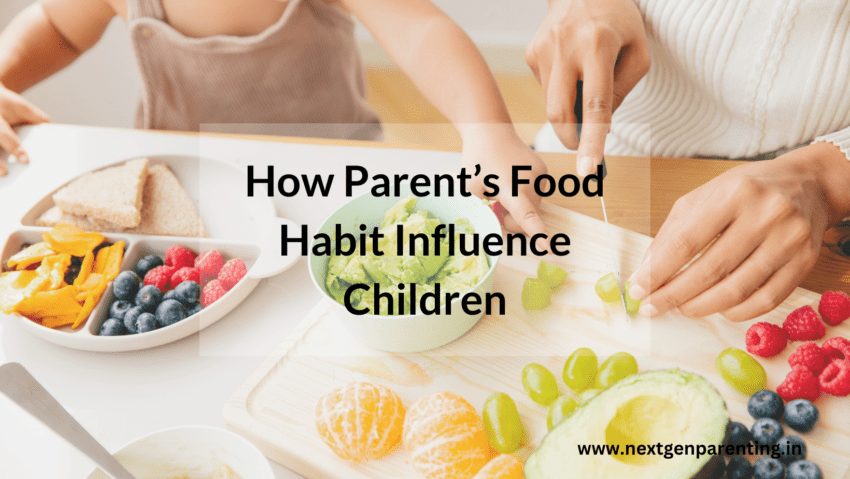Healthy eating habits are essential for the growth, development, and overall well-being of children. While schools, friends, and media can influence a child’s eating patterns, parents remain the most significant role models in shaping these habits. Good food habits are the best practice to follow as parents and instill in children.
However, when parents have unhealthy food habits, it can negatively impact their children’s dietary choices, leading to long-term health consequences.
In this article we explores the various ways in which parents’ unhealthy food habits affect their children’s eating behaviors and provides practical tips for promoting a healthier lifestyle for the entire family.
The Influence of Parental Behavior on Children
Children are natural and good copycat, and they often learn by observing the actions of those around them, especially their parents.
When parents consistently make poor food choices, such as consuming fast food, sugary snacks, and high-calorie, low-nutrient meals, children are likely to mimic these behaviors.
The saying “actions speak louder than words” holds true in this context; parents who preach healthy eating but do not practice it send mixed signals that can confuse children and undermine the importance of nutrition.
Children are great observers and they do what you do not what you say.

Establishing Norms Around Food
The eating environment parents create at home sets the stage for their children’s relationship with food.
For example, if parents often skip meals, overeat, or use food as a reward or comfort, children may adopt similar behaviors.
Using food as a coping mechanism or associating it with emotions like happiness or stress can lead to disordered eating patterns.
These behaviors are often rooted in the home environment where children are exposed to how their parents handle food.
(many times we do emotional eating and can’t control ourselves. Instead of being aware of emotional eating and getting out of it, we continue that practice which negatively affects our own body and influences a child’s food habits)
Availability and Accessibility of Unhealthy Foods
The types of food parents bring into the home significantly influence what children eat.
If the kitchen is stocked with sugary drinks, processed snacks, and junk food, children are more likely to consume these items regularly.
On the other hand, if parents prioritize keeping healthy options like fruits, vegetables, whole grains, and lean proteins available and accessible, children are more inclined to choose nutritious foods.
Meal Structure and Eating Patterns
Parents’ meal structures, such as whether they eat regular meals, eat together as a family or frequently rely on takeout, can impact children’s eating patterns.
Family meals provide an opportunity to model healthy eating and foster a positive relationship with food.
Where as, chaotic eating schedules, frequent snacking, and a lack of structured meal times can lead to irregular eating habits in children, such as overeating, picky eating, or neglecting balanced meals.
Which leads to lifestyle diseases, for instance, diabetes, heart problems, liver dysfunction, and many more.
Impact on Children’s Health
Unhealthy eating habits learned in childhood can cause serious problems later in life.
Poor dietary choices can lead to various health issues, including obesity, type 2 diabetes, heart disease, and deficiencies in essential nutrients.
Moreover, these habits often continue into adulthood, creating a cycle of poor health outcomes that can be difficult to break.
You might like to read- 5 Amazing Activities to Cope with Stress for Teenagers
Breaking the Cycle: Promoting Healthy Habits
While the impact of parents’ unhealthy food habits on children is concerning, it is never too late to make positive changes. Here are some practical steps parents can take to promote healthier eating habits in their family:
Be a Positive Role Model:
Demonstrate healthy eating by choosing nutritious foods, eating balanced meals, and maintaining a positive attitude towards food. Show children that healthy eating can be enjoyable and satisfying.
Create a Healthy Eating Environment:
Stock the kitchen with a variety of healthy foods, and limit the availability of junk food and sugary snacks. Encourage children to try new fruits, vegetables, and whole grains.
Prioritize Family Meals:
Eating together as a family not only promotes healthier eating but also strengthens family bonds. Make family meals a regular part of your routine.
Involve children in meal planning and preparation to get their interest in good food.
Teach Nutrition and Cooking Skills:
Educate children about the importance of nutrition and involve them in cooking. This helps them understand what goes into their meals and empowers them to make healthier choices.
Most liked Article- 10 Best Ways to Improve Family Bonding
Set Realistic Expectations and Be Patient:
Changing eating habits is a gradual process.
Set realistic goals, be patient, and celebrate small victories along the way.
Avoid pressuring children to eat certain foods, as this can create a negative association with healthy eating.
Give them time to change their eating habits and try out the healthy dishes they like along with some which are unlikely to make them habitual and develop taste.
Must Read for You- Why Do Children Take Mobile More Often- Or They Are Addicted?
Encourage Mindful Eating:
Teach children to listen to their bodies’ hunger and fullness cues.
Avoid using food as a reward or punishment, and promote mindful eating practices to help children develop a balanced approach to food.
Must Read Article- Educate Your Children about Nutrition for the Healthy future
Conclusion
Parents play a critical role in shaping their children’s eating habits, and their influence can have lasting effects on their children’s health.
By being mindful of their own food choices and creating a positive eating environment, parents can guide their children toward healthier habits that will benefit them throughout their lives.
It is important for parents to recognize the impact of their actions and take proactive steps to model healthy eating behaviors.
Setting the foundation for their children’s lifelong health and well-being could be the greatest gift from you.
I hope you get value from this article. We like to hear from you so please share your thoughts and experience with us. Feel free to ask questions we are grateful to help you.
Happy Parenting

Great article! I really appreciate the clear and detailed insights you’ve provided on this topic. It’s always refreshing to read content that breaks things down so well, making it easy for readers to grasp even complex ideas. I also found the practical tips you’ve shared to be very helpful. Looking forward to more informative posts like this! Keep up the good work! YouTube Downloader Online
Thank you so much for your kind words! I’m glad to hear that the article resonated with you and provided helpful insights. It’s always my goal to break down concepts in a way that’s easy to understand while offering practical tips that can be applied in real life. I truly appreciate your feedback and encouragement. I look forward to sharing more content in the future!
Great article! I really appreciate the clear and detailed insights you’ve provided on this topic. It’s always refreshing to read content that breaks things down so well, making it easy for readers to grasp even complex ideas. I also found the practical tips you’ve shared to be very helpful. Looking forward to more informative posts like this! Keep up the good work! YouTube Downloader Online
Thank you so much for your kind words! I’m glad to hear that the article resonated with you and provided helpful insights. I truly appreciate your feedback and encouragement. I look forward to sharing more content in the future!